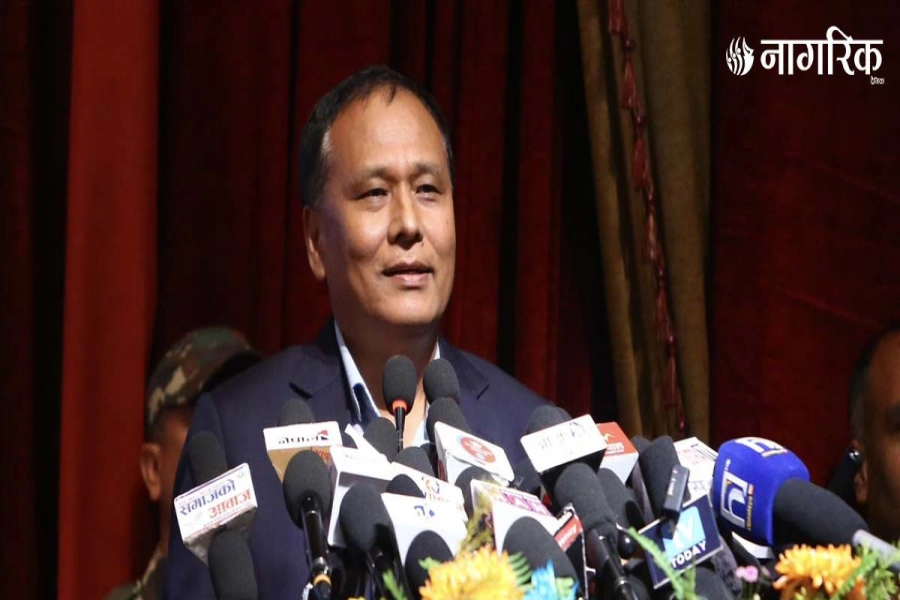Tao Zhang, deputy managing director of the International Monetary Fund (IMF), is visiting Nepal this week on the invitation of Nepali authorities. The visit of the senior IMF official comes in the wake of a forecast that Nepal's economy will grow at a moderate pace after achieving 7.5 percent of real GDP growth rate in the last fiscal year. Releasing the World Economic Outlook last month, the IMF estimated Nepal's economy to grow by 5 percent in Fiscal Year 2017/18. In an email interview with Sagar Ghimire of Republica, the IMF's deputy managing director talked about the IMF's engagement in Nepal, the fund's macroeconomic assessment and recommendations to Nepal for achieve sustainable and inclusive growth. Excerpts:
What is the agenda of your meeting? What message are you bringing?
I am very pleased to visit Nepal on the invitation of Nepali officials. I am eager to see for myself how the Nepalese economy has recovered since the devastating earthquakes, and I look forward to exchanging views with various stakeholders regarding Nepal's development priorities going forward and how the IMF can help.
Could you please share with us the IMF's current macroeconomic assessment of Nepal?
NCP releases manifesto pledging double-digit growth, jobs, and...

The economy has made a strong recovery from the impact of the earthquakes and trade disruptions, with real GDP growth reaching 7.5 percent in 2016/17. For 2017/18, we expect growth to moderate to about 5 percent as activity is beginning to run up against capacity constraints. Inflation has decelerated to a multi-year low of 3 percent in recent months, but we expect inflation to rise somewhat once food prices pick up. Nepal's external position remains quite strong, thanks to the large inflow of remittances. Overall, the macro economy remains resilient, and the challenge now is to extend the recovery and secure high and inclusive growth. This requires two things: first, a supportive macroeconomic policy mix. With a more expansionary fiscal stance -- linked to the fiscal decentralization plan, monetary policy will need to be tightened to ensure that inflation and balance of payments pressures remain in check. Second, structural reforms should be implemented to encourage investment and make growth more inclusive.
What are the reforms and the works that the government should do to increase budget implementation as well as improve the efficiency of spending?
The government has taken important steps to increase capital spending in FY 2016/17 and should continue efforts to address infrastructure gaps and spur economic growth. Nepal would benefit from more realistic budgets that effectively prioritize spending with the largest growth dividends. In addition, capital expenditures should be executed more evenly throughout the year to enhance efficiency and quality. Here, the IMF is providing technical assistance to help strengthen the government's capacity to plan, prioritize, and implement capital spending.
Financial sector reforms seemed to have not been accelerated in line with the Financial Sector Assessment Program recommendations. Are recommendations in IMF Article IV consultation reports being implemented?
The 2014 Financial Sector Assessment Program (FSAP), which was Nepal's first, identified a number of financial sector vulnerabilities, including asset quality weaknesses and interconnections in the financial system. Financial sector reforms to address the identified weaknesses are proceeding gradually and broadly in line with FSAP recommendations. Still, further progress is needed to mitigate macro-financial risks. Financial sector supervision should be strengthened, and loan classification, provisioning, and banks' risk management practices should be upgraded, building on the recent amendments to several aspects of the regulatory framework. The recent cyber-attack on a commercial bank in Nepal is of course also a matter of concern and highlights the importance of strengthening protections against cyber fraud across the financial system.
What needs to be done so that Nepal can also catch up with India and China and gets economically integrated and benefited from the spillover effects?
Building on Nepal's strong track record of macroeconomic stability and fiscal and debt sustainability, structural reforms will be essential to unlock growth. Key priorities include strengthening capacity to implement higher and better-quality public capital spending and enhancing the business climate by fostering competition, improving the functioning of labor markets, and reducing the regulatory burden for private investment. Upgrading transport infrastructure and developing hydropower sector are also indispensable. In this regard, it is encouraging that ample development financing -- grants and concessional loans -- are available to Nepal to support the needed structural reform efforts.
How do you see the relationship between Nepal and the IMF?
The IMF is closely engaged with Nepal. In the aftermath of the earthquakes, the IMF lent US$ 50 million to Nepal under our Rapid Credit Facility. The IMF also helps to improve capacity in core areas of macro-economic policymaking. In this regard, I am very pleased about the recent establishment of the South Asia Regional Training and Technical Assistance Center (SARTTAC) in New Delhi, which is jointly funded by development partners and beneficiary countries. SARTTAC increases our available resources for technical assistance and capacity building, and will thus allow us to better serve Nepal and other South Asia countries.
HIGHLIGHTS:
- The recetn cyber-attack on a commercial bank in Nepal is of course also a matter of concern and highlights the importance of strengthening protections against cyber fraud across the financial system.
- Nepal would benefit from more realistic budgets that effectively prioritize spendign with the largest growth dividends.
- With a more expansionary fiscal stance--linked to the fiscal decentralizationn plan, moetary policy will need to be tightenned to ennsure that inflation and balance of paymennts pressures remain in check.






































